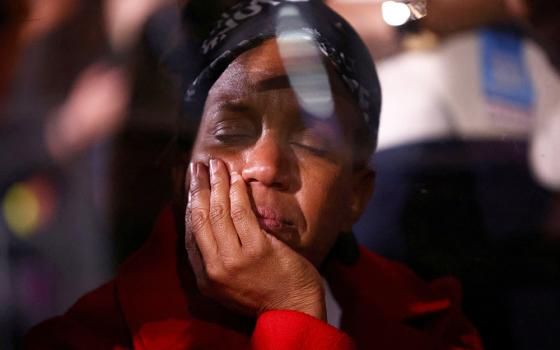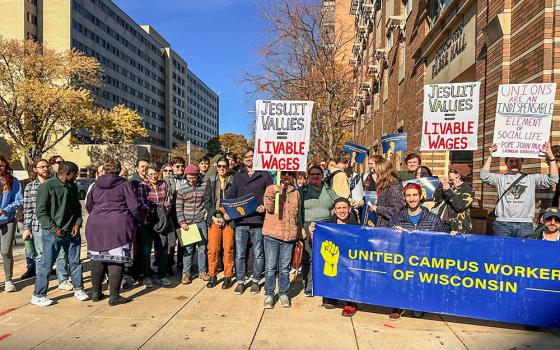The politics of the HHS mandates is, at once, easier and more difficult than looking at the ecclesial implications. For starters, the politics will be played out before a fickle electorate and a media intent on ambulance chasing. Here we are this weekend discussing profound constitutional issues regarding the relationship of Church and State, and the President’s budget, and the mayhem and murder in Syria, and the threat of a nuclear armed Iran, but as soon as Whitney Houston died, everything else went away. Mind you, I liked Ms. Houston’s singing, and I feel very badly for her family, but the way our media and the electorate responds to the ebb and flow of events has little to do with the gravity of the issues at stake.
In examining the politics of the HHS mandate and the subsequent accommodation, it must be said at the outset that we would not be in this mess if we had a single payer system. If, instead of the byzantine approach to health care reform, we had adopted “Medicare for Everybody,” we would not be having this debate. I don’t know if a single payer system would have made it through Congress: that really would be government-run health care. But, I remain hopeful that the great state of Vermont’s experiment with single payer will be so successful that, within a few years, the whole country will collectively slap its hand to its forehead and say, “Duh – of course that is the way to go.”
For me, the politics of the HHS mandates issue has always been simple. Any policy, and the HHS mandate is a policy, even if you think it is a very good and desirable policy, must be pursued within the principles articulated in our Constitution. One of the principles is the right to freely exercise our religion. And so, in keeping with the arguments used in the 9-0 Supreme Court decision last month in the Hosanna Tabor v. EEOC case, I have argued that the right of a church to conduct its own affairs free from government interference should trump the concern to extend contraception coverage without copays to women who work at religious institutions. Even if you think contraception is a good thing, and even if you think it should be available at no cost, I think you have to admit that the health of America’s political and social culture requires us to defend the First Amendment rights of our churches.
Secondly, I have never, and do not now, buy into the idea that the whole religious liberty issue is nothing but a ploy by the bishops to defeat Obama in the next election. Yes, there are some bishops who make irresponsible and nasty comments about the president and who, in a manner I find unbecoming in a religious leader, assign foul motives to everything this president does. But, I do not think that indictment can be laid at the feet of the president of the USCCB, Cardinal-designate Timothy Dolan, who met with the president in November and went to the USCCB meeting and spoke warmly, almost glowingly, of that meeting and of the president’s responsiveness to the concerns Dolan raised. In fact, some bishops are reported to have challenged Dolan in the executive session, and he stood his ground. I just don’t think Dolan is the kind of man who is looking for a war, although he is most definitely the kind of man who is looking for a win.
The problem in so much of the debate over the HHS mandate is that people on both the left and the right are bringing their prior narratives to bear on the events, blocking out the actual factual issues involved. As I mentioned yesterday, Thomas More tried to figure out if he could take the oath, he really tried, before concluding he could not. So, let’s take a sentence that encapsulates the argument of those who do think the USCCB has become an arm of the Republican National Committee, who buy into the narrative I suggest is based more on prior bias than on the facts. How’s this: The bishops are going to oppose Obama no matter what he does because they hate Democrats.
Now, let’s keep the same sentence structure, and even the same verb, and try a different subject and object: President Obama is going to oppose the Catholic Church no matter what he says because he hates religion. That, mutatis mutandi, was the argument put forward, most unhelpfully, by Archbishop Charles Chaput in his op-ed in the Philadelphia Inquirer, which actually urged his readers not to focus overmuch on the details, but to accept, hook, line and sinker, his version of an Obama administration at war with the Catholic Church. As much as I think the President has been wrong on this matter, I do not think he has been motivated by anti-Catholic bias. I am grateful that the email we in the Archdiocese of Washington got from our archbishop, Cardinal Wuerl, last night was far less vitriolic and focused on the issues at hand, not any pre-existing anti-Obama narrative.
While I continue to believe President Obama is not motivated by any hatred of the Catholic Church, I also believe – actually, we do not have to believe this because the evidence could not be more obvious – that it would be difficult to imagine how he could have bungled this issue more badly than he did. Starting with the initial proposal from HHS – headed by Secretary Kathleen Sebelius who should be fired – the president has set off down a path he did not need to walk. I can’t believe that he could not have gone to pro-choice groups in August and said, “Look, we will be extending free contraceptive care to some 20-25 million women. We really don’t have to extend it to another 1 million if that means trampling on, or even being perceived to trample on, the First Amendment.” But, alas, he did not say that. Then, in November, Obama met with Dolan and said he understood Catholic concerns in this matter and that Dolan would be pleased with his decision. When Obama failed to deliver on that promise, his decision looked not just like a bad decision but a betrayal. Then, when the firestorm broke out in the last three weeks, instead of sitting down with the USCCB to work out a compromise, he ignored them, calling only to announce his decision, not to discuss what might work. If you have a problem with someone, you need to talk with that someone to fix it. The lack of trust between the bishops and the administration right now has many sources but both sides need to find a way to negotiate again. To those members of the White House staff who see the Catholic bishops as obscurantist leftovers from an earlier time, an enemy to your policy goals, and as people who leak to Republicans, well, hold your nose and get over it because those same bishops are in part responsible for helping educate hundreds of thousands of poor children, and caring for hundreds of thousands of injured fellow citizens, and feeding, and clothing and sheltering hundreds of thousands of the poor and the homeless. If you are a bishop who thinks Obama is untrustworthy, in the pocket of Planned Parenthood, a secret enemy of the Church, hold your nose too: you need the president for immigration reform and that, too, is an issue on which you bishops must be fighting to protect your own.
Obama’s accommodation, which he announced last Friday, was, as the bishops initially noted, a step on the right direction, an effort to address our concerns. It may be gimmicky, but sometimes gimmicks work. Coupons are gimmicks, but I clip them.
The question before the USCCB, and other Catholics, now is how to respond. The bishops will, of course, continue to oppose the inclusion of abortifacient drugs, sterilization and contraception in the mandated basic care package. Whatever you think of Humanae Vitae, it should surprise no one that the bishops still support it. On this, the bishops will lose, and they know they will lose because even Republicans will be unlikely to be seen as opponents of contraception, but they have every right to make their case. It is something different for the USCCB to suggest that the employer mandate itself must be revoked because it offends the conscience rights of corporations. Even Michael Gerson, in this morning’s Washington Post, admits that this idea is “a bridge too far in our current cultural and political context” and that it amounts to reacting to the president’s overreach with an overreach of our own. I would add that the most disappointing part of the second statement issued by the USCCB on Friday was that when it raised the issue of secular, private individuals and corporations, it failed to mention that employers have a moral obligation to provide health insurance for their employees, whether or not they have a legal obligation. Gerson has some street cred on these issues in my book because almost alone among conservative commentators, he has consistently chastised Republicans for their failure to pursue the compassionate conservative approach to government, opting instead for the dog-eat-dog libertarian model. The USCCB should keep their focus on the issue of exemptions for religious organizations.
One more thing about the USCCB. Will someone there please say a good word about the need to extend preventive care for women. No, you don’t have to support contraception, and you don’t have to even support the Affordable Care Act – although everyone who thinks the bishops are really GOP stooges should explain why the conference has not once called for the repeal of that law – but can you say a kind word about the moral necessity of making health care for women a priority for the nation. Please.
As I indicated yesterday, the most offensive part of this whole mess is the suggestion that our faith-based charities, schools and hospitals are not sufficiently religious to qualify for a religious exemption. It is this that offends us social justice Catholics who see our work on behalf of the poor as integral to our faith, different but just as important as our Sunday worship. It is now clear that President Obama, as opposed to candidate Obama, no longer sees this, or is, at any rate, unwilling to draw the logical conclusions from it although I applaud the call of Bishop Cupich to see in Obama’s earlier speeches on this subject as a source of potential common ground for dialogue. Maybe that dialogue will happen and maybe it will be fruitful. I suspect the issue of what kind of religiously affiliated institution does and does not deserve an exemption will be decided in the courts and that we will win.
I confess I no longer understand Obama. He did not go to the mat to end the Bush tax cuts for the super-rich. He did not go to the mat for comprehensive immigration reform. He did not go to the mat to close Guantanamo Bay. He did not go to the mat for Card Check. He did not go to the mat for a public option in the health care reform. But, he went to the mat over the principle that a Catholic college or charity or hospital is not really religious.
The president not only is the chief magistrate of the land, he is the leader of the Democratic Party. I know I am something of an odd duck by being what I call an “Ella Grasso Democrat.” Grasso was the first woman to be elected a governor of her state in her own right, not succeeding her husband. She was pro-labor. She was pro-Israel. She was pro-higher taxes on rich folk. She stood up for the little guy. Unlike other male Democrats – Kennedy and Gore and Gephardt and Muskie – she remained pro-life. I believe that it is the historic calling of the Democratic Party to stand up to the moneyed interest and say that the common good, not just the individual pursuit of profit, is a moral obligation and a necessity in a free and just society. I am simply not interested in a Democratic Party that is so beholden to the fundraisers at Emily’s List, so consumed with lifestyle politics, that it is willing to thumb its nose at those working class voters who really do care about social justice and for whom that care is a part of their religious beliefs. And, if liberals no longer care about a robust defense of the First Amendment, well, then, we do not deserve the presidency.
Of course, the other side is worse. Repeat, of course the other side is worse. I am still waiting for someone to ask a GOP candidate: Sir, you have criticized the president for his attack on religious liberty. (Candidate nods or even interrupts to repeat the criticism.) So, will you promise that, if elected, you will instruct your Justice Department to bring suit against the state of Alabama to strike down their anti-immigrant law, which has been opposed by the Catholic Church for the exact same reasons they have opposed the HHS mandates? I would like to see a clean bill expanding the conscience exemption go to Congress, but you can bet the GOP leaders in the House would load it up with poison pills so that nothing will get passed and they will have a useful election year issue to help them hold onto the gains they made in 2010.
As I say, I no longer understand President Obama. I was not party to the discussions within the administration on this issue, so I don’t know who said what, or what arguments were made. But, from the outcome, we can conclude that the President never stopped the conversation to say, “We can’t do that!” By “that” I mean pick a fight with the leaders of the largest religious denomination in the country. By “that” I mean not ignore First Amendment concerns, even if it limits the reach of a policy he very much wishes to pursue. By “that” I mean decide, in effect, that the freedom of religion is now only a freedom to worship.
In order to get my vote back, I do not expect President Obama, like Henry II, to go to Becket’s tomb for public penance. Nor do I expect him, like Henry IV, to walk through the snows at Canosa to beg pardon from the pope. But, he would have to indicate that he understands why it was wrong, very wrong, not to say “We can’t do that!” I am not holding my breath. I continue to withhold my vote.




